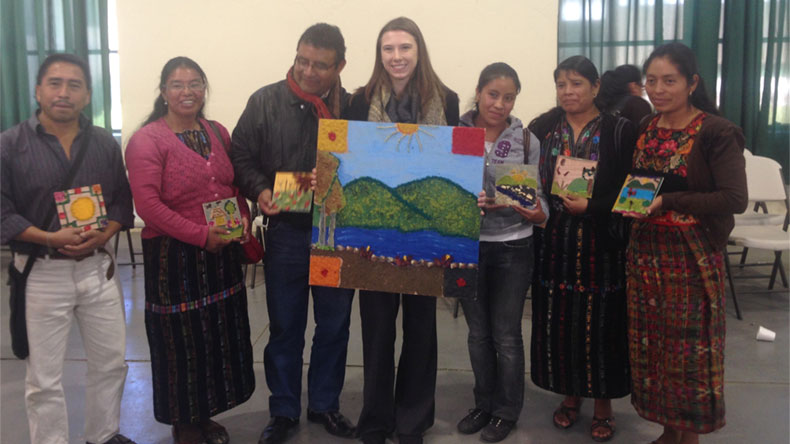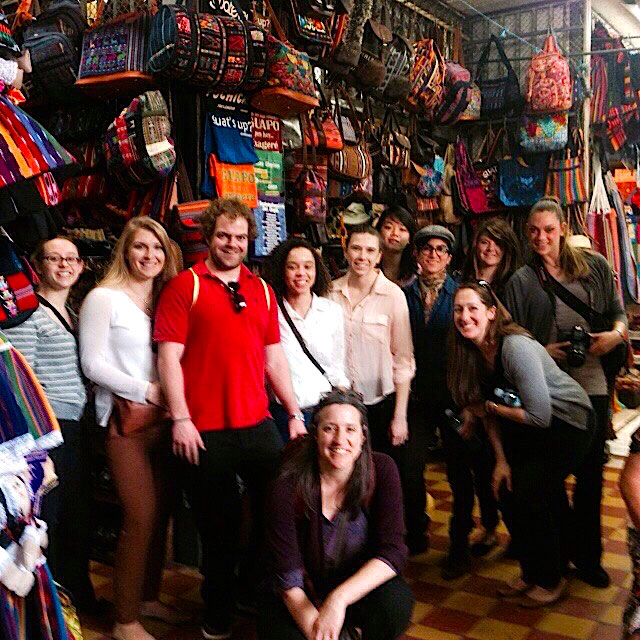Students Return from Life Changing Journey to Guatemala

Students Return from Life Changing Journey to Guatemala
The William James College students who recently returned from the first Guatemala Immersion Course described their experiences as, "life-changing, transformative, unforgettable, rewarding, difficult, and eye-opening." Many of these graduate students had never encountered the field of expressive arts therapy, a foreign culture, or the possibility of communication without shared language. "I learned something very powerful about utilizing the arts as a mode of communications, inquiry, and healing during our immersion," said Milay Lemos. We were working with Guatemalan students and teachers through a variety of vehicles. "I am not the foreign expert importing ready-made solutions to their problems," continues Milay. "Rather, they are the experts on their own experiences. Art is but one vehicle to access individual and community sources of wisdom."
Through colorful images of flowers, volcanoes, the sun, community, freedom, love and Lake Atitlan, the students from both countries shaped vivid, dramatic drawings, paintings, and collages as they forged bonds that reflected their shared values. "We overcame the boundaries of language," said Leanna Pilet, who created pages in her art journal with another student, Carson Byrne. "I felt I was testing my limits," said Carson, sharing his thoughts about the power of the shared connection he felt to images of water and family.

Paola Michelle Contreras, PsyD, Director of the Global Mental Health Program in the Counseling Psychology Department, describes the importance of this work in its ability to bring people together, to re-establish connections between people from different communities, both within Guatemala and between U.S. and Guatemala."Creating these connections," she says, "is conducive to building a path toward healing. After decades of Guatemala's brutal civil wars, marked by horrific violence and genocide, "We were working across racial and ethnic lines to explore in a safe place what we have in common." Dr. Contreras has been building partnerships, trust and credibility with her Guatemalan colleagues for years, engaging in discussions that have slowly grown the numbers of parties interested in this approach. "The teachers there made it clear to me their students who'd participated in the workshops saw changes. Kids were talking about unity, tolerance, cultural identity, sharing their narratives and engaging in art as a way to cross cultures, despite different local dialects. This helps create tolerance and resilience in the context of civil war trauma," says Dr. Contreras.
Nely Can, Director of Continuing Education Services at the Universidad del Valle, Altiplano, and a major catalyst behind the program, understands well the power of art as a vehicle to help children talk about their feelings. The educational center where the workshops take place is a former military base, the site of detention, torture, disappearance and other atrocities.
Dr. Contreras works closely with Michelle Harris, LMHC, ATR-BC, Core Faculty in the Expressive Arts Therapy program in the Counseling Psychology Department, who also brings a human rights perspective to her work and has, for many years, engaged the arts to help people heal. Given the history of poverty and war, and the absence of available mental health services in Guatemala, Professor Harris says they wanted to learn how to build community and resilience for young people and adults. "We follow their lead," she says, "Art is meaningful in their communities, so it was a good way to start potentiating resilience." Professor Harris shares Dr. Contreras' tremendous respect for their Guatemalan colleague Nely Can who is "worrying about the kids who are not successful in school" whose lives might be influenced by this pilot program and Ana Alicia Coma, Director of Counseling at UVG, Guatemala. According to Michelle Harris, "We're figuring out together, in collaboration with our trusted colleagues in Guatemala, how to structure this for sustainable community engagement."
- Tags:
- In the Community
Topics/Tags
Follow William James College
Media Contact
- Katie O'Hare
- Senior Director of Marketing
- katie_ohare@williamjames.edu
- 617-564-9389
